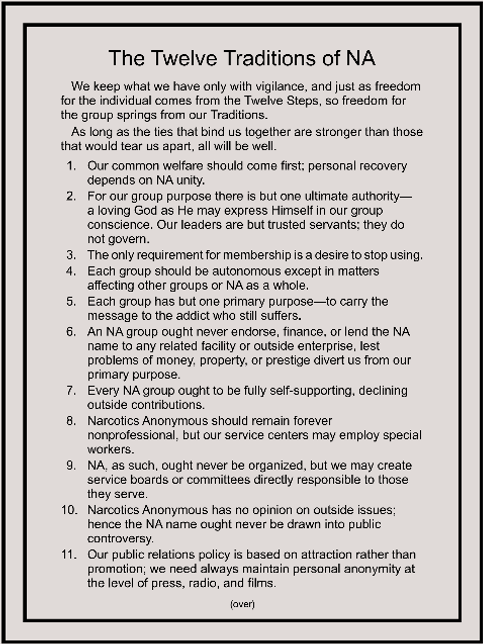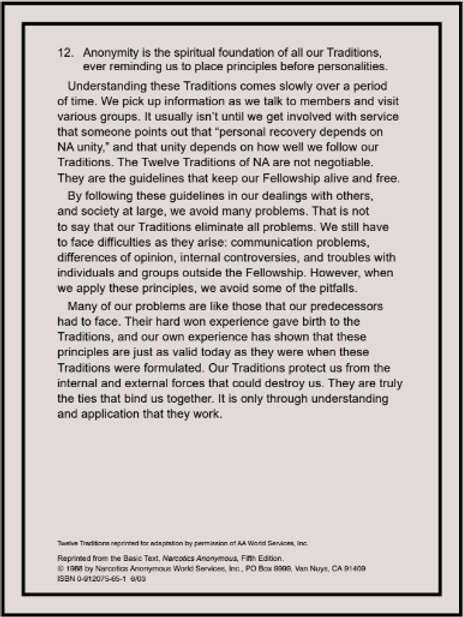
💙Welcome to Narcotics Anonymous For Newcomers!💙
Narcotics Anonymous For Newcomers!
Download 12 Traditions Click Here to Download The Reading
What is the 12 Traditions of Narcotics Anonymous Program?


The 12 Traditions of Narcotics Anonymous (NA) serve as the foundational principles that guide the group’s interactions and philosophy. These traditions are integral to maintaining the unity, safety, and growth of NA, ensuring that the fellowship remains focused on its primary purpose: helping those who are struggling with addiction achieve and maintain recovery.
This article provides an in-depth analysis of each of the 12 Traditions of Narcotics Anonymous. It is optimized to provide both an educational experience for newcomers and a detailed understanding of NA’s framework for those in recovery. By emphasizing key SEO terms such as “Narcotics Anonymous,” “NA Traditions,” “12 Traditions of NA,” and “addiction recovery,” this content is designed to improve search engine rankings while delivering valuable insights into the structure of the fellowship.
What Are the 12 Traditions of Narcotics Anonymous?
Narcotics Anonymous (NA) is an organization dedicated to helping individuals recover from addiction through the support of a fellowship of people who share their experiences, strengths, and hopes. The 12 Traditions of NA offer a set of guidelines that ensure the group's unity, purpose, and longevity. These traditions promote inclusivity, anonymity, and shared responsibility among its members, helping them create a safe and supportive environment for recovery.
The 12 Traditions serve as a foundation for all NA meetings, events, and activities, and are essential to maintaining the group’s principles of unity, service, and a focus on the primary purpose—helping individuals who suffer from addiction.
The 12 Traditions of Narcotics Anonymous in Detail
Each of the 12 Traditions addresses a specific aspect of NA's functionality, from how meetings are conducted to the group’s relationship with outside entities. Below is a detailed breakdown of each of the 12 Traditions, along with their relevance to the everyday operation of Narcotics Anonymous.
Tradition 1. Our common welfare should come first; personal recovery depends on NA unity.
This first tradition emphasizes the importance of unity within Narcotics Anonymous. It sets the tone for the entire fellowship, reminding members that the strength of the group is what supports each individual’s personal recovery. Unity within the group is essential for maintaining a safe, supportive space where individuals can focus on their recovery without the distractions of conflict or division.
The collective strength of the fellowship is what ensures that each individual receives the help they need. The personal recovery of every member is inherently tied to the health of the fellowship as a whole.
Tradition 2. For our group purpose there is but one ultimate authority—a loving God as He may express Himself in our group conscience. Our leaders are but trusted servants; they do not govern.
The second tradition introduces the concept of group conscience, which allows for decisions to be made collectively in alignment with the group's best interests. This tradition is central to the idea that no individual has power over others within the fellowship. The authority of NA is rooted in a higher power (as understood by each individual), and it is not about governing or controlling others, but about serving the collective needs of the group.
NA leaders, such as chairpersons and secretaries, are considered trusted servants who guide the group without exerting control over it. The concept of “trusted servants” allows for decentralized leadership, giving every member an opportunity to contribute to the group’s direction.
Tradition 3. The only requirement for membership is a desire to stop using.
This third tradition underscores the openness and inclusivity of Narcotics Anonymous. Anyone who has a desire to stop using drugs can become a member of the fellowship, regardless of their past experiences or background. The principle behind this tradition is that addiction knows no boundaries, and anyone who wishes to seek help for their addiction is welcomed with open arms.
By eliminating barriers to entry, this tradition ensures that NA is accessible to anyone who needs it. It fosters an environment where members are not judged for their past or present struggles with addiction but are instead supported as they work toward recovery.
Tradition 4. Each group should be autonomous except in matters affecting other groups or NA as a whole.
The fourth tradition highlights the autonomy of individual NA groups.
While each group is free to operate independently, they must also remain mindful of the impact their decisions may have on other groups or the fellowship as a whole. This principle supports the idea that each group can function according to its unique needs and circumstances, allowing for flexibility and local adaptation. However, when a group’s decisions or actions affect the broader NA community, they are encouraged to seek guidance from the fellowship's collective conscience.
This tradition is designed to ensure that while NA groups have the freedom to run their meetings and activities as they see fit, they also remain responsible to the larger fellowship. This promotes unity while preserving the individual group's ability to make decisions.
Tradition 5. Each group has but one primary purpose—to carry its message to the addict who still suffers.
The fifth tradition is a reminder of the primary mission of Narcotics Anonymous: to help those who are still suffering from addiction. This tradition keeps the focus on the group’s main goal—recovery for those who have not yet found it. It helps ensure that all activities and meetings of the group are centered around the primary purpose of supporting those in need.
The focus on the message of recovery ensures that any effort within the group, whether it is organizing events or providing literature, is always aligned with this mission. By focusing on helping others, groups maintain their relevance and connection to the core values of NA.
Tradition 6. An NA group ought never to endorse, finance, or lend the NA name to any related facility or outside enterprise, lest problems of money, property, and prestige divert us from our primary purpose.
The sixth tradition prohibits NA groups from endorsing or associating with outside enterprises or institutions, including commercial or for-profit organizations. This prevents the fellowship from becoming entangled with financial or business interests that could distract from the primary mission of helping individuals in recovery. By remaining independent of outside financial interests, NA ensures that its focus stays on recovery, not on building financial or social prestige.
This tradition upholds the integrity of the fellowship by safeguarding it from the influence of outside forces that could undermine its mission.
Tradition 7. Every NA group ought to be fully self-supporting, declining outside contributions.
The seventh tradition encourages groups to remain financially self-sufficient by generating their own funds through voluntary donations from members. By declining outside contributions, the fellowship ensures that its independence and neutrality are preserved. This prevents any external influence from swaying the group's decisions or actions.
Financial independence also empowers members to take responsibility for the operation of their group and to maintain control over their activities. It fosters a sense of ownership and accountability within the fellowship.
Tradition 8. Narcotics Anonymous should remain forever nonprofessional, but our service centers may employ special workers.
This tradition establishes the nonprofessional nature of NA. While members of the fellowship can offer support and guidance to one another, NA does not rely on paid professionals to provide its services. The emphasis is on peer support, where individuals help others based on shared experiences rather than professional expertise.
However, this tradition allows for the hiring of special workers for administrative or logistical tasks that require specific expertise, such as office work, bookkeeping, or technical support. These workers are not seen as professionals in the traditional sense but are hired to support the fellowship's functioning.
Tradition 9. NA, as such, ought never to be organized; but we may create service boards or committees directly responsible to those they serve.
This ninth tradition stresses that Narcotics Anonymous should not be a structured, hierarchical organization. Instead, it encourages the fellowship to remain a decentralized community of individuals. The tradition allows for the creation of service boards and committees that exist to serve the fellowship, ensuring that the organization is responsive to its members’ needs without becoming overly bureaucratic or rigid.
These service boards and committees operate with the understanding that they are accountable to the members of the fellowship and should always prioritize the welfare of the community over the maintenance of organizational structure.
Tradition 10. Narcotics Anonymous has no opinion on outside issues; hence the NA name ought never be drawn into public controversy.
The tenth tradition helps maintain the neutrality of Narcotics Anonymous, ensuring that the fellowship does not become involved in political, social, or other outside issues. By avoiding public controversy, NA ensures that its focus remains on the recovery of those struggling with addiction. This tradition encourages members to hold personal opinions but reminds them that these opinions should not be attributed to the fellowship as a whole.
The tradition of neutrality allows NA to maintain its broad appeal and inclusivity, ensuring that it remains a welcoming space for individuals from all walks of life, regardless of political or ideological beliefs.
Tradition 11. Our public relations policy is based on attraction rather than promotion; we need always maintain personal anonymity at the level of press, radio, and films.
The eleventh tradition emphasizes that Narcotics Anonymous does not seek to promote itself through advertising or public relations campaigns. Instead, it relies on the personal stories of its members and the positive word-of-mouth experiences shared by those who have benefited from the fellowship. This tradition ensures that NA’s focus remains on personal recovery, rather than on public image or fame.
By maintaining personal anonymity at the level of press, radio, and films, this tradition protects the privacy and dignity of its members while also ensuring that NA remains a humble and low-profile organization. The principle of attraction over promotion helps maintain the integrity of the fellowship and encourages individuals to seek recovery for its own sake, not for public recognition.
Tradition 12. Anonymity is the spiritual foundation of all our Traditions, ever reminding us to place principles before personalities.
The twelfth and final tradition highlights the importance of anonymity within Narcotics Anonymous. Anonymity is the cornerstone of the fellowship, ensuring that no individual is placed above or below another based on status, fame, or personal identity. This principle reinforces the idea that NA is about recovery, not about individual egos or recognition.
By placing principles before personalities, this tradition fosters humility, equality, and a sense of shared responsibility. It encourages members to focus on their spiritual growth and the collective well-being of the group, rather than on their personal achievements or recognition.
The Importance of the 12 Traditions for NA and Its Members
The 12 Traditions of Narcotics Anonymous serve as a guide for both individuals and the fellowship as a whole. By adhering to these principles, NA ensures that its members remain focused on recovery and that the fellowship remains a safe and supportive space for anyone who seeks help. These traditions help maintain the balance between personal autonomy and group unity, ensuring that the focus remains on the primary purpose: recovery from addiction.
For new members, understanding the 12 Traditions provides a roadmap for how to engage with the fellowship. It helps set expectations for behavior and interaction, offering a structure that promotes mutual respect and support. For long-time members and those involved in service positions, these traditions offer guidance for decision-making, leadership, and how to handle conflicts within the fellowship.
In summary, the 12 Traditions of Narcotics Anonymous are not merely a set of rules, but the spiritual foundation that sustains the fellowship. They are the guidelines that enable the community to stay focused on its purpose, ensure the unity of its members, and maintain the integrity of the recovery process. By upholding these principles, NA continues to be a place where individuals can find healing, support, and hope.